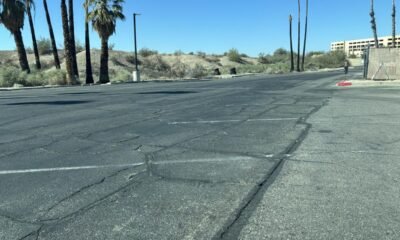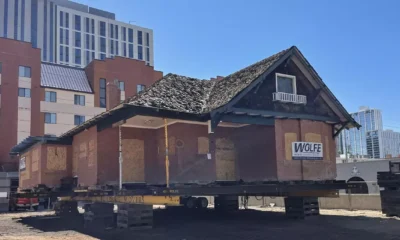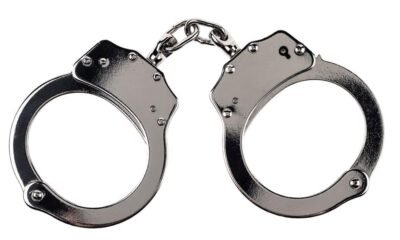building code
City Takes Aim at Private Sports Courts in Bold New Move

The Sedona City Council convened on October 9 for a work session, where members expressed support for establishing new regulations governing pickleball courts located on private property.
This discussion was prompted by complaints from residents in the Chapel area during the public comment segment of the September 24 City Council meeting. Locals voiced concerns about the construction of a private pickleball court, citing potential noise as a health risk for themselves and their pets.
“Currently, our Land Development Code lacks specific regulations around sport courts, and we’ve typically treated them similar to concrete patios in a backyard,” stated Planning Manager Cari Meyer. While she noted that certain features like fences and lighting might require permits, there is no existing requirement for a permit specifically for sport courts.
City staff conducted an aerial photography review and identified two courts at Los Abrigados Resort and Poco Diablo Resort, along with four in homeowners’ associations and seven at private residences. The nature of these courts includes five for tennis, one for basketball, and one for pickleball.
Meyer added, “Our investigation into code enforcement at these properties revealed no documented noise complaints related to the courts.” City Attorney Kurt Christianson clarified that any construction that complies with existing regulations would be considered grandfathered under new rules.
“For instance,” Christianson remarked, “if the city were to enact a new requirement for a 200-foot setback from property lines, existing courts would not need to be removed.” Regarding noise, Meyer explained that Sedona has general noise regulations that apply across the community.
Christianson emphasized that the city does have provisions to issue citations for excessive noise if it disrupts neighborhood peace. “Curiously, none of the neighbors have raised concerns about current courts,” he noted.
Councilman Brian Fultz raised the possibility of an emergency moratorium on constructing new courts to prevent a surge in applications while regulations are reviewed, questioning if the situation constituted an emergency. Christianson responded, “There’s no clear emergency here; the proposed regulations are reasonable time, place, and manner restrictions rather than outright bans.”
Questions about possible mitigation for existing courts were raised, with Christianson indicating that generally, such measures wouldn’t be enforceable since existing constructions fall under grandfathered status. Outgoing Councilwoman Jessica Williamson questioned the logic behind imposing mitigation where none had been requested.
Councilwoman Kathy Kinsella recommended a comprehensive approach to future sporting regulations, mentioning the need to anticipate changes in community recreation patterns. Her concern centered on the potential for noise generated by small tournaments, prompting a discussion on limiting the number of courts per property.
During the prior meeting, a resident claimed they recorded noise levels of 110 decibels from pickleball play. They argued that this intensity could indeed breach the city’s noise limit of 60 dB at the property line. Another resident described pickleball noise as “unbearable” and warned of possible legal repercussions against the city for neglecting to address it.
Williamson stated, “I don’t want to inhibit enjoyment, but there’s a limit to acceptable noise levels.” She characterized the noise from pickleball as uniquely disruptive, suggesting that the council focus specifically on regulating pickleball courts rather than sport courts broadly.
Hollis Furman echoed these sentiments, stating that the noise generated by pickleball is particularly jarring, further supporting the idea of implementing specific regulations. Kinsella suggested reasonable regulations on court size, screening, and lighting.
Fultz stressed the urgency of helping neighbors affected by noise, advocating for more regulations targeting pickleball. He was not alone; Dunn expressed interest in a more comprehensive ordinance covering all percussive sports.
Vice Mayor Holli Ploog emphasized a need for regulation, voicing her concerns over noise levels. Mayor Scott Jablow acknowledged that while other sports like tennis and basketball can be noisy, the sound of pickleball is particularly invasive.
A part of the city’s agenda stated, “While discussions have primarily focused on pickleball, any new regulations would apply to all sport courts.” Ploog supported examining the possibility of reducing noise limits, while Dunn indicated that the council should evaluate existing noise ordinances to ensure they align with community expectations.
Meyer indicated that drafting stricter regulations would require a three to four-month process to amend the Land Development Code. In a related note, the city opened eight new pickleball courts at Posse Grounds Park on October 22.






![Top left: Judge Stephen F. McCarville. Top right: A restraining order on a judge's bench. Background: Maricopa Municipal Court. [Bryan Mordt/City of Maricopa/Pix4free]](https://arizonanews.org/wp-content/uploads/2025/06/City-Faces-Surge-in-Restraining-Orders-Outpacing-Population-Growth-400x240.jpeg)
![Top left: Judge Stephen F. McCarville. Top right: A restraining order on a judge's bench. Background: Maricopa Municipal Court. [Bryan Mordt/City of Maricopa/Pix4free]](https://arizonanews.org/wp-content/uploads/2025/06/City-Faces-Surge-in-Restraining-Orders-Outpacing-Population-Growth-80x80.jpeg)









